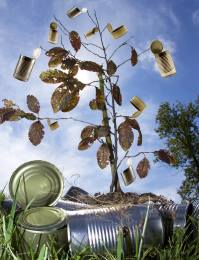Sustainable Living & Sustainable Lifestyle
Creating a Sustainable Earth Starts with Small Steps!
Protecting this beautiful, blue marble we call home may seem like a daunting task to the mere individual. What can one person do to help protect our planet when it is constantly bombarded from all corners with waste and environmental calamity? It may seem at times like a hopeless task, but don’t be discouraged. There are small ways anyone can contribute that collectively make a large impact!
Think Global – Act Local. First put forth 45 years ago, this concept focuses on the importance of the individual. Every one of us leaves a carbon footprint as we walk through this world. Minimizing that footprint, even when using the smallest of steps, can collectively produce big results. Here are 10 simple ways each of us can help to minimize the stresses we place on Mother Earth.
Reuse. Paper plates, plastic shopping bags, disposable coffee cups. We’ve become a throwaway society. Instead of contributing to overflowing landfills, think about what you can add to your life that is reusable. Grocery stores now sell reusable bags. Major beverage chains allow you to bring your own reusable cups. Holiday wrapping paper, bows and boxes can easily be saved and reused. Think of your own creative ways to reuse instead of dispose.
 Recycle. Paper, plastics, glass and cans can all be recycled. You can even add some silver to your pocket by taking aluminum and other metals to recycling centers yourself. But have you given much thought to recycling your organic trash? That’s exactly what you do when you compost – which can also help to reduce the amount of money you might spend on fertilizer for your garden.
Recycle. Paper, plastics, glass and cans can all be recycled. You can even add some silver to your pocket by taking aluminum and other metals to recycling centers yourself. But have you given much thought to recycling your organic trash? That’s exactly what you do when you compost – which can also help to reduce the amount of money you might spend on fertilizer for your garden.
Reduce. Trash disposal fills dumps and consumes energy in the process. Recycling consumes energy to transform materials from one object into another. The simplest way to reduce your negative impact on this planet is to reduce your consumption.
Food sourcing. Speaking of consumption, where you get your food may be as important as how much you consume. There was a time fresh oranges were only available in winter if someone traveled to Florida to buy them. Now we expect to be able to eat fresh produce regardless of the season. Think about how far that kiwi had to travel to arrive at your grocery store – and the amount of energy it took to get it there – is it really worth it? Try eating locally grown, seasonal foods whenever possible. Plant your own garden and freeze or can for winter.
Filter not bottled. We all love a refreshing glass of water, but all those plastic bottles need to be recycled or disposed of. A better solution is to buy a water filter for your tap or refrigerator. This helps to cut costs as well.
Car maintenance. A well maintained car consumes less gas. Keep tires inflated to the manufacturer’s specifications. Get regular tune-ups and oil changes. When it comes time to replace your current ride, think high gas mileage, hybrid or alternate fueled vehicles.
Make a list. Avoid making many small trips in the car. Cluster errands together to prevent having to drive back and forth across town. Make a grocery list to minimize repeated trips to the market. You will be amazed at the time this will save for you as well.
Unplug. We all have electronic devices that require frequent recharging, but leaving the plugs in the wall when not connected to a device results in ‘vampire’ energy consumption. Pull them from the socket, and while you’re at it unplug that coffee pot or stereo system that’s driving up the electric bill simply by displaying the wrong time on its built in clock.
Turn down. Timothy Leary may have told us to “Turn On, Tune In, and Drop Out”, but we really should be Turning Down. Find the temperature that provides comfort without waste – say 68 degrees in winter or 72 degrees in summer. Don’t forget to throw on a sweater or turn on a fan to help make those temperatures more comfortable. Use timers on thermostats to avoid heating rooms that aren’t in use in the middle of the night. Turn hot water heaters down or off when leaving on vacation.
Energy efficiency. Manufacturers continue to make vast improvements in the energy efficiency of so many of our day to day appliances. Light bulbs, refrigerators and electric cars are just a few of the areas you can explore getting bigger bang for your energy dollars.
Each of these items are meant to plant a few seeds of inspiration on how you can make small steps to help preserve and keep our planet beautiful – and most of them also come with the added benefits of money or time savings as well. I wish I could be around 45 years from now to hear the praise’s future generations sing about the results of our conservation efforts!
—
All images copyright Karen Foley via Dreamstime.com. Karen Foley is a professional freelance photographer who loves to write about topics she is passionate about. See more of her work on Dreamstime or by visiting her personal website.